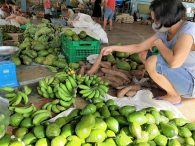The Philippines still has a high number of cases and high mortality. The entire mainland Luzon is under an enhanced community quarantine. A total lockdown has been declared in major provinces in Luzon and the Visayas island groups. But there will be a relaxation of the lockdown in some areas where there are zero or a low number of cases. The government has allocated allocate USD 4 billion to address COVID-19.
Because of lockdowns, curfews, and community quarantine, all schools, workplaces, malls, restaurants, offices both public and private were ordered to close and stop operating for a period of one month. Only essential businesses were allowed to operate such as markets, groceries, pharmacies, food production, and drug stores but only with a skeleton workforce.
It also means only one person at a time can leave their residences and, in many cases, only during specific hours of the day. SNFOs are limited to gathering information from their members by SMS or phone (a few would use online chat platforms) which are gathered at the national FO level.
Initially, national FOs focused on providing information about preventing the coronavirus and information on government guidelines on food production and logistics. The NFOs are now concentrating on linking producers with institutional and commercial buyers in the cities who are running out of supplies for relief food packs.
NIA is also working with other CSOs and farmers network to advocate for: (1) support for food producers (farmers, fishers, farmworkers, including those in processing and logistics) being front liners of the food supply chain; (2) enhanced health service to our farmers who are vulnerable to COVID due to their advanced age (average age of farmers in Ph is 58); (3) for local governments to source directly from farmers for the fresh food pack relief that they will distribute to people who lost their daily wage jobs due to the lockdown; and (4) easy passage through lockdown security checkpoints of fresh food produce from farms to urban center. NIA is also developing communication materials to be published in social media platforms on those advocacies. NIA and other NFOs are also linking with groups who buy fresh produce for distribution to LGUs or to fresh markets.
PAKISAMA continues to participate in the networks to influence policy concerning the pandemic. They are also increasing their capacity in social media and other technological platforms. The neediest among the population was given USD 100 as support and they are helping farmers access it. Seeds are also distributed to farmer members. Cooperatives to help the farmers are also being organized.
The organization also initiated a farmers’ market where vegetables, fruits, and other products of the IP community in Daraitan, Rizal are sold to consumers in Metro Manila.
One of PAKISAMA’s member cooperatives, the Panaw Sumilao MPC, also distributed food packs in their community and the cooperative purchased the coffee products of the smallholder farmers in the community.
When the lockdown was imposed, a young farmer member of PAKISAMA also took the initiative to request seeds from the Agriculture Department in his area and repacked these and distributed to the residents in his village to encourage them to start home gardening.
PAKISAMA has three learning during this time of pandemic:
- Programs are affirmed such as the asset reform is important to make them pandemic resilient. Monocrop farmers may have land but no food. IDOFS program is important for food and nutrition security. Markets are hard to access but it is easier with cooperatives. The problems faced are because the programs are still not scaled up and the advocacies are still not implemented and it contributed to the suffering of the people.
- Movement of strong food consumers cooperatives. During the time of the pandemic, it is important to have cooperatives working in the urban area wherein the products of the farmers can be directed to the city and bought to a higher price. These cooperatives will have a role in the distribution of food in households.
- Social media is useful in reaching the farmers, and most of them have not utilized it before.

Comments are closed